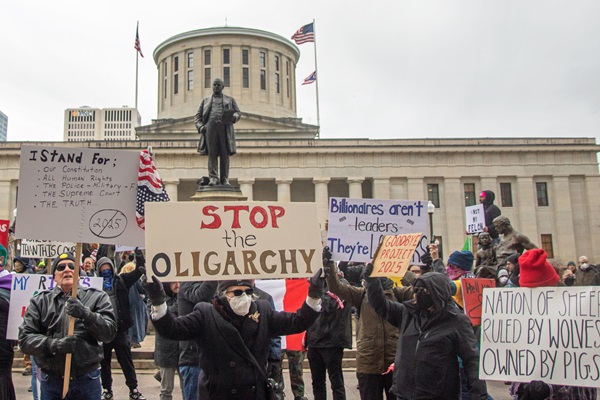.png)

Rajesh Mahapatra, ex-Editor of PTI, has deep experience in political and economic journalism, shaping media coverage of key events.
April 17, 2025 at 10:55 AM IST
The State of California and its Governor, Gavin C. Newsom, have filed a lawsuit in the Federal Court for the Northern District of California against US President Donald Trump, arguing his tariffs are “illegal” and “unconstitutional.”
The lawsuit comes a day after Trump upped the ante by raising reciprocal tariffs against China to 245%.
The lawsuit asserts that the American Constitution does not vest the US president with authority to impose tariffs and that any such authority must come from an act of the US Congress.
It contends that Trump has been improperly using the International Economic Emergency Powers Act to justify his tariffs. The lawsuit claims that tariffs are not among the actions the IEEPA authorizes the President to take during a declared emergency, and the word "tariff" does not even appear in the relevant statute.
A tariff, the lawsuit states, is a tax placed on goods imported into a country, assessed at the port of entry, with the cost borne by the distributor receiving the goods in the United States, not the country of origin. This directly contradicts claims that other countries pay these tariffs.
Moreover, no president has previously relied on the IEEPA since its enactment in 1977, it says.
Growing Resistance
US Fed Chief Jerome Powell on Wednesday issued a stark warning, saying the tariffs are stoking higher inflation and risking slower growth.
“Tariffs are highly likely to generate at least a temporary rise in inflation. The level of tariff increases announced so far is significantly larger than anticipated, and the same is likely to be true of the economic effects, including higher inflation and slower growth,” Powell said at a meeting of the Economic Club of Chicago.
Both survey- and market-based measures of near-term inflation expectations have moved up significantly, with survey participants pointing to tariffs. The inflationary effects could also be more persistent, Powell said.
The Fed may find itself in the challenging scenario in which its dual mandate goals—of price stability and maximum employment—are in tension, he said.
Powell said the Fed, before it makes the next move on interest rates, will continue to analyze the incoming data, the evolving outlook, and the balance of risks, keeping in mind that elevated levels of unemployment or inflation can be damaging.
Powell’s remarks didn’t go down well with the markets, as the Dow Jones Industrial Average slipped 1.73%, while the Nasdaq Composite Index fell 3.2%.
Asian markets, however, opened in the green and rose sharply on the back of better-than-expected first-quarter GDP data reported by China.
Also, the California lawsuit and Beijing’s conditional willingness to hold talks with US negotiators raised hopes that Trump may finally see reason in revisiting his tariff plan.
California is the biggest manufacturing and agricultural producer state in the United States. It is also America’s technology hub. Its economy is larger than that of almost every foreign country, except for China, Germany, and Japan.
Therefore, no state has more at stake in the burdens imposed by Trump's tariffs than California. The lawsuit is being asserted on behalf of the 40 million Americans who live in California.
What Next
Last week, bowing to growing criticism at home and a devastating impact on the bond market, Trump announced a 90-day pause on reciprocal tariffs except for those applying to China. In fact, he has since increased tariffs on Chinese imports to 245%.
His strategy, it appears, is to isolate China in the trade war, while using the 90-day window to win over other trading partners through bilateral trade deals. Beijing, however, has yet to blink.
The growing resistance to his plans at home, as underscored by the California lawsuit, will likely embolden America’s trade partners to harden their stance. For example, India has gone quiet on its offer of zero-for-zero tariffs since Trump announced the 90-day pause.
Although Trump has said that more than 70 countries had approached Washington to negotiate deals, no tangible progress has been reported so far. The California lawsuit could just make matters worse in this regard.
It is also likely that other American states, especially those ruled by Democrats, may choose to follow in the footsteps of California. The fact that California’s Governor, Newsom, chose to announce the lawsuit at a press conference in Central Valley—a Republican stronghold—underscores increasing bipartisan support for the campaign against tariffs.
If California prevails, it would reaffirm Congress's sole authority over tariffs and limit the President's ability to unilaterally impose them based on emergency powers. It will also be a boost to the resistance to tariffs that Trump has been facing inside America.
Jessica Levinson, a law professor based in Los Angeles, told a local television news channel the lawsuit "has a chance in court." The tariffs are "illegal" because the Constitution clearly gives the US Congress the power to regulate foreign commerce.
And whether the US Congress has ceded some of this authority to the President through statutes is a constitutional question that the courts will have to weigh in on, as they decide the fate of the lawsuit—and thus, the immediate future of global trade.




